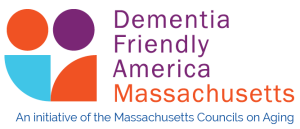Create an Action Team; Identify a Leader or Co-Leaders
Action teams are comprised of residents, community representatives, local government officials, or anyone in the community interested in shaping the dementia friendly initiative in their city or town. Its members should include representatives from at least three community sectors. While conducting their work, action teams should involve people directly affected by dementia. Action teams have a leader or co-leaders responsible for convening and leading the team’s collaborative work. Some examples of community leaders include members of the local faith community, a home care agency owner, a librarian, or a former Council on Aging Board member. The action team is responsible for reviewing resident needs; assessing options for addressing those needs; and developing and implementing an action plan. As action teams review the needs of their residents, some helpful resources include the community profiles and The Massachusetts Healthy Aging Data Report developed by UMass Boston’s Gerontology Institute with the support of the Tufts Health Plan Foundation.
Step 2: Engage with Residents
While an action team works to assess community needs and develop a dementia friendly community action plan, it often makes sense to concurrently take some initial steps to help its team and community members understand dementia, and what it means for people who are living with the condition. There are several ways to raise awareness, for example:
- Share 2.5-minute videos depicting life with dementia and the benefits of dementia friendly communities. View sector vignettes from Dementia Friendly America that offer profession-specific guidance.
- Convene a dementia friendly night at the local library where a person living with the dementia talks about what it would mean to live in a dementia friendly community
- Convene Dementia Friends information session(s) Dementia Friends is a global movement that is changing the way people think, act, and talk about dementia.
- Convene training for community professionals available from the Alzheimer’s Association MA/ NH Chapter. For more information about this free training entitled, “Dementia & Your Community,” call 1-800-272-3900.
Additionally, dementia friendly communities work best when members of the community participate and work together. Communities will typically gather people from their city or town who have expressed enthusiasm for making their community more dementia friendly. Many action teams hold an informational session to inform the general public about the intention of introducing dementia friendly actions. Invitation and outreach materials are available to help generate interest and recruit residents including people living with dementia and their care partners, civic leaders, and local government officials.
Step 3: Develop an Action Plan & Begin Implementation
Taking action is a community’s most essential part of working toward becoming more dementia friendly. By listening to residents, especially people living with the condition; identifying and reviewing resident needs; and developing an action plan, communities are able to identify their priorities and take action. Many communities take the opportunity to convene a kickoff event to celebrate the completion of their action plan. This type of kickoff meeting often serves as a way to engage the community and promote awareness of the community’s dementia friendly initiative. Templates of invitations and marketing materials for a kickoff event are available for communities to use. Communities should inform the Dementia Friendly Massachusetts project manager of the status of their action plan and its implementation at patty@mcoaonline.com so that they can be directed to relevant and valuable resources, technical assistance and advice.
Step 4: Be Recognized for your Commitment
To be recognized for their commitment to implement the steps outlined in the community’s action plan, the action team submits the Dementia Friendly Massachusetts (DFM) Pledge, which is available here. Communities can email their signed Pledge to the DFM Project Manager, Patty Sullivan at patty@mcoaonline.com. The DFM Pledge requires that communities include names and signatures of members of the action team leader(s) and at least one municipal leader or elected official. Communities will be recognized for their commitment. They will receive a certificate and public recognition for being on their way to becoming a dementia friendly community.
Step 5: Celebrate Progress and look for ways to Continue to Improve
Using the Action plan to guide them, communities can access and celebrate new progress and identify new opportunities. The action plan is not static and instead reflects revisions as communities continue to make progress and continuously improve.
